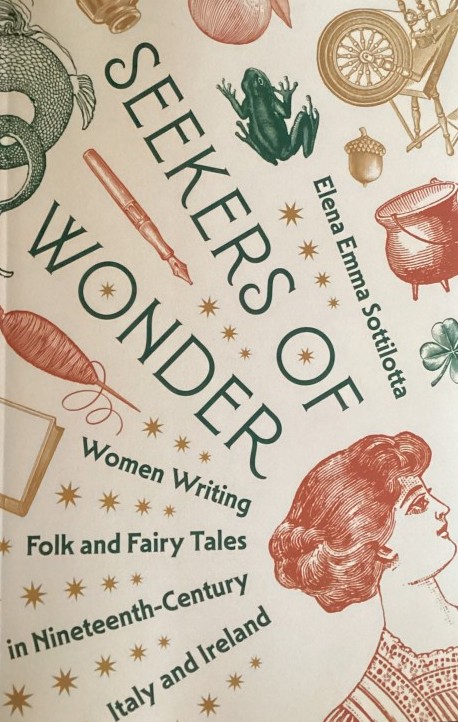Inspiring Older Readers
 posted on 23 Apr 2025
posted on 23 Apr 2025
Seekers of Wonder by Elena Emma Sottilotta
The sub-title of this book – Women Writing Folk and Fairy Tales in Nineteenth-Century Italy and Ireland – will give you a usefully encapsulated idea of what Seekers of Wonder is setting out to explore. But I think it’s fair to say that this is likely to be a book that’s going to appeal to an academic audience rather than the casual reader – it’s densely argued, rigorously referenced and uncompromisingly complex.
Sottilotta sets herself the task of asking why it is that women have so often been marginalised or made invisible for their contribution to the collection of folklore and fairy tales. Her focus centres on case studies of four women involved in these activities between 1870 and 1920 in Italy (specifically Sardinia and Sicily) and Ireland – all these geographical locations sharing the common characteristic of being large islands with their own folklore and fairy traditions. Her preferred methodology is interdisciplinary, utilising the concept of intersectionality which emphasises the idea that marginalisation is the result of numerous discriminatory factors working together.
She sets the scene in the opening section by acknowledging that the role women have played in the preservation and promotion of folklore and fairy tales has, over recent years, finally been acknowledged more widely in academic study:
“This volume situates itself within the ongoing process of rediscovering women’s roles as writers, collectors, transcribers, translators, compilers, tellers and protagonists of wonder tales. As a whole, this book intends to take a step further in reassessing and recentering the memories of several women in Italian and Irish folklore, building on the foundational works of committed folklorists that have previously investigated some of these figures and traditions.”
Following her opening section, Sottilotta looks in detail at the careers of four examples of women she considers have made significant contributions – two from the Italian traditions and two from the Irish: Laura Gonzenbach, who collected Sicilian wonder tales; Grazia Deledda, who wrote Sardinian ethnographic sketches, legends, and fairy tales; Jane Wilde, who published anthologies of Irish folklore; and Augusta Gregory, who collected traditional narratives in the west of Ireland.
The case is made that women have played a very specific, key role by providing links across and between other important cultural centres and, in particular, ‘translating’ the folk contribution to the more scholarly and academic studies of folklore.
Throughout, Sottilotta emphasizes the role of women as crucial intermediaries between different cultural groups—in particular, between the world of the “folk” and the world of scholarly folklore studies. Unearthing rare archival material and reading these writings from the perspective of gender, she sheds light on the identity dynamics that animated the cultural phenomenon of collecting folk and fairy tales in this era:
“Through this parallel study of Italian and Irish folklore and their collectors, it has been possible to recognize the similar challenges that female figures had to face at the turn of the century and their shared efforts toward the making of their nations and the preservation of cultural heritage.”
It's clear that this study has been a labour of love for the author and her passion shines through. As I suggested at the outset of this review, it's an academic achievement that will prove invaluable to others studying in this field.
Available now from Princeton University Press, you will be able to order a copy from your local independent bookshop – who will be happy to order you a copy if they don’t have one on their shelves.
Terry Potter
April 2025